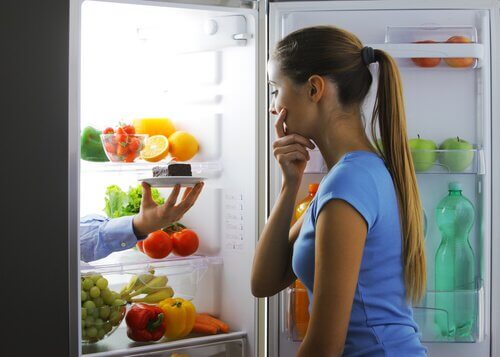Why do You Overeat at Night?


Reviewed and approved by the doctor Karla Henríquez
An old saying tells us to eat breakfast like a king, lunch as a prince, and dinner like a beggar. Despite its good intentions, this is a difficult recommendation to follow. It’s especially hard when you get home from work. Therefore, you aren’t alone when it comes to overeating at night.
And we’re not just talking about overeating during dinner. It’s not uncommon for people to raid the fridge for a snack in the middle of the night. You might justify this by saying a little food helps you fall sleep.
A large dinner not only hurts your sleeping quality, but it has other unpleasant consequences. Experts say eating too much at night will have you feel guilty, sad, and irritable. Thus, causing negative affects on your rest and quality of sleep.
Reasons why you overeat at night

Your circadian rhythms can also play an important role in overeating at night. Studies indicate that your biological clock encourages you to eat high starch sweet and salty foods. This behavior helps our ancestors store energy. However, today it has negative effects and makes it harder to maintain a healthy weight.
Recommended reading: 7 foods that improve your mood
Why do you eat at night?
The preference for that late dinner or midnight snack is to eat carbohydrates. This type of food not only gives you pleasure: it’s actually an addiction that won’t let you feel full.
Foods that are high in carbs are also high in calories. When you eat them at night, you’re consuming a large percentage of the calories which you should distribute throughout the day.
It’s no surprise foods high in carbohydrates are known as “comfort foods.” This means these foods can make you feel good and sometimes even relieve stress. This is the type of food your body craves constantly.
Why is it a bad idea to overeat at night?

A heavy dinner or a midnight snack can increase your blood sugar and insulin levels. If you do this regularly, you’ll be the perfect candidate for type II diabetes. Eating a lot at night can also increase your cholesterol levels. This is one of the main causes of heart disease or a heart attack.
Read also: 8 easy ways to quickly burn 100 calories
Other reasons not to overeat at night
- Overeating at night can alter your sleep patterns. It can even cause strange dreams and nightmares, especially in young people.
- Eating at night can affect your memory, learning and cognitive functions.
- According to studies, eating after 7pm increases your risk of a heart attack.
- Eating too much and going to bed triggers gastroesophageal reflux.
- Due to the insulin your body produces when you eat, you’ll feel more hungry when you wake up.
Tips to avoid overeating at night

- Avoid eating dinner late. It’s better to have your last meal before 8 or 9pm.
- Plan your meals. If you have a meal plan for each day it’s easier to keep control of yourself. Getting home tired and not knowing what to eat can lead to overeating.
- Write down a list of what you eat during the day. When you do this, you become aware of the type and amount of foods you consume. With that in mind, you can modify your eating habits so you’ll feel less hungry at night.
- Although it might sound simple, maintaining a good sleep routine will reduce your trips to the fridge in the night. Staying up too late allows you to give into temptation and eat every two to three hours.
All cited sources were thoroughly reviewed by our team to ensure their quality, reliability, currency, and validity. The bibliography of this article was considered reliable and of academic or scientific accuracy.
- Grant CL, Coates AM, Dorrian J, Kennaway DJ, Wittert GA, Heilbronn LK, Pajcin M, Della Vedova C, Gupta CC, Banks S. Timing of food intake during simulated night shift impacts glucose metabolism: A controlled study. Chronobiol Int. 2017;34(8):1003-1013. doi: 10.1080/07420528.2017.1335318. Epub 2017 Jun 21. PMID: 28635334.
- Jensen T, Abdelmalek MF, Sullivan S, Nadeau KJ, Green M, Roncal C, Nakagawa T, Kuwabara M, Sato Y, Kang DH, Tolan DR, Sanchez-Lozada LG, Rosen HR, Lanaspa MA, Diehl AM, Johnson RJ. Fructose and sugar: A major mediator of non-alcoholic fatty liver disease. J Hepatol. 2018 May;68(5):1063-1075. doi: 10.1016/j.jhep.2018.01.019. Epub 2018 Feb 2. PMID: 29408694; PMCID: PMC5893377.
- Aune D, Giovannucci E, Boffetta P, Fadnes LT, Keum N, Norat T, Greenwood DC, Riboli E, Vatten LJ, Tonstad S. Fruit and vegetable intake and the risk of cardiovascular disease, total cancer and all-cause mortality-a systematic review and dose-response meta-analysis of prospective studies. Int J Epidemiol. 2017 Jun 1;46(3):1029-1056. doi: 10.1093/ije/dyw319. PMID: 28338764; PMCID: PMC5837313.
This text is provided for informational purposes only and does not replace consultation with a professional. If in doubt, consult your specialist.








